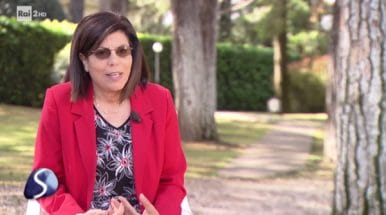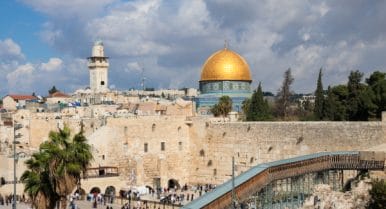 June 1967: It was precisely fifty years ago that Israel occupied the Palestinian Territories. Ever since then, there has been a succession of violent encounters and many deaths. Nevertheless, many continue to work at building a peaceful future. Among them is Margaret Karram, already a member of the Episcopal Commission for Interreligious Dialogue from the Assembly of Catholic Ordinaries of the Holy Land, and collaborator in the direction of the Interreligious Coordinating Council in Israel (ICCI). Since 2014 she has been working at the Focolare International Centre in Italy. Margaret K.: “I was born in Haifa, a city in Galilee, and my land has always been under conflicts, battles, and the domination of several peoples. Our home is on Mt Carmel, in a Jewish quarter. We were the only Catholic Christian Arab family orginially from Palestine. I remember when I was small, maybe six years old, some children began to insult me heavily saying that I was Arab and couldn’t stay in that quarter. I ran to my mother in tears, asking the reason why. In response, my mother told me to invite those children over to our house. She had baked some Arab bread and gave it to them to take to their families. From such small gestures we began to make contact with our Jewish neighbours who wanted to know the woman that had performed such a gesture. This taught me that even a small act of love towards a neighbour is capable of overcoming a mountain of hatered.” Margaret’s story continues with a description of memories and events that bear witness to the difficulties she had to face. Arab, Catholic Christian, Margaret is an Israeli citizen. Like other Christians many of her relatives had to flee to Lebanon during the war years. So she never got to know much of her family, because her father decided to stay with the grandparents. She felt a growing desire to build bridges of brotherhood. “I dreamed about peace from the time I was small. I often used to go to the Arab quarters in Jerusalem, Bethlehem or in other Palistinian territories. Arab was spoken – which is my first language – the people could tell from my accent that I came from Galilee which is Israel territory. Likewise, if I spoke in Hebrew they made me notice that my accent was different from theirs. I had a sense of confusion about my identity: I was neither Palistinian nor Israeli… At age 15 I got to know the Focolare Movement, and the spirituality of Chiara Lubich gave me wings to fly. I felt that I didn’t have to change people, but change me, my heart. I went back to believing that other people were a gift for me and that I could be a gift for them.
June 1967: It was precisely fifty years ago that Israel occupied the Palestinian Territories. Ever since then, there has been a succession of violent encounters and many deaths. Nevertheless, many continue to work at building a peaceful future. Among them is Margaret Karram, already a member of the Episcopal Commission for Interreligious Dialogue from the Assembly of Catholic Ordinaries of the Holy Land, and collaborator in the direction of the Interreligious Coordinating Council in Israel (ICCI). Since 2014 she has been working at the Focolare International Centre in Italy. Margaret K.: “I was born in Haifa, a city in Galilee, and my land has always been under conflicts, battles, and the domination of several peoples. Our home is on Mt Carmel, in a Jewish quarter. We were the only Catholic Christian Arab family orginially from Palestine. I remember when I was small, maybe six years old, some children began to insult me heavily saying that I was Arab and couldn’t stay in that quarter. I ran to my mother in tears, asking the reason why. In response, my mother told me to invite those children over to our house. She had baked some Arab bread and gave it to them to take to their families. From such small gestures we began to make contact with our Jewish neighbours who wanted to know the woman that had performed such a gesture. This taught me that even a small act of love towards a neighbour is capable of overcoming a mountain of hatered.” Margaret’s story continues with a description of memories and events that bear witness to the difficulties she had to face. Arab, Catholic Christian, Margaret is an Israeli citizen. Like other Christians many of her relatives had to flee to Lebanon during the war years. So she never got to know much of her family, because her father decided to stay with the grandparents. She felt a growing desire to build bridges of brotherhood. “I dreamed about peace from the time I was small. I often used to go to the Arab quarters in Jerusalem, Bethlehem or in other Palistinian territories. Arab was spoken – which is my first language – the people could tell from my accent that I came from Galilee which is Israel territory. Likewise, if I spoke in Hebrew they made me notice that my accent was different from theirs. I had a sense of confusion about my identity: I was neither Palistinian nor Israeli… At age 15 I got to know the Focolare Movement, and the spirituality of Chiara Lubich gave me wings to fly. I felt that I didn’t have to change people, but change me, my heart. I went back to believing that other people were a gift for me and that I could be a gift for them.  Living in Jerusalem I was often tempted to get discouraged, especially during the Palestinian uprising. We had some very bad moments in the city: many times the attacks happened in public places, even on the bus I took every day to work. I was frightened. I carried on because I had a community I could share the Focolare spirituality with. And I finally found my true self as a Christian, Catholic, witness to hope. It was an important step which freed me from the fears and uncertainties. I could love everyone, Arab and Israeli, assisting at small miracles, seeing Jews and Muslims change attitude and start to build peace.” Obviously, there are a lot of projects. Many organizations work for peace through art, education, social action… Many people like her try to enkindle the light that can illuminate the darkness with glimmers of heaven. In June 2014, Margaret was invited to be part of the Christian delegation at the prayer invocation for peace with Pope Francis, Patriarch Bartholomew, Shimon Peres who was the president of Israel at the time and Abu Mazen, president of Palestine. “Right after that meeting there was war on the Garza Strip. The Pope’s invitation to the two Heads of State to work for peace between their people seemed in vain. But it was a historic event, an important step. I perceived the power of prayer and understood that human hearts can only be changed by God. We should continue to invoke peace from God. Like the olive trees we planted that day, that peace might take root and let us see the fruits.” Video (Italian)
Living in Jerusalem I was often tempted to get discouraged, especially during the Palestinian uprising. We had some very bad moments in the city: many times the attacks happened in public places, even on the bus I took every day to work. I was frightened. I carried on because I had a community I could share the Focolare spirituality with. And I finally found my true self as a Christian, Catholic, witness to hope. It was an important step which freed me from the fears and uncertainties. I could love everyone, Arab and Israeli, assisting at small miracles, seeing Jews and Muslims change attitude and start to build peace.” Obviously, there are a lot of projects. Many organizations work for peace through art, education, social action… Many people like her try to enkindle the light that can illuminate the darkness with glimmers of heaven. In June 2014, Margaret was invited to be part of the Christian delegation at the prayer invocation for peace with Pope Francis, Patriarch Bartholomew, Shimon Peres who was the president of Israel at the time and Abu Mazen, president of Palestine. “Right after that meeting there was war on the Garza Strip. The Pope’s invitation to the two Heads of State to work for peace between their people seemed in vain. But it was a historic event, an important step. I perceived the power of prayer and understood that human hearts can only be changed by God. We should continue to invoke peace from God. Like the olive trees we planted that day, that peace might take root and let us see the fruits.” Video (Italian)
Put love into practice
Put love into practice




0 Comments